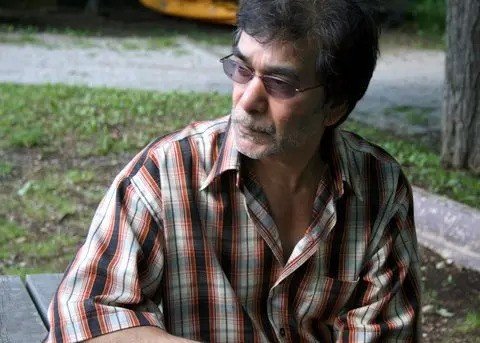A House for Mr. Narpat
Talk about your anxiety of influence, there is nothing like an author's oedipal preoccupation with an inspiring, if overwhelming, literary forebear. V. S. Naipaul makes a formidable father figure, especially for Indian novelists writing in English, especially for writers of the Indo Caribbean, especially for writers who, like Naipaul, were born in Trinidad. Especially, I guess, for Rabindranath Maharaj, who confronts this oedipal angst head-on in his latest work, A Perfect Pledge .
A Perfect Pledge, simultaneously released in Canada and the U.S., established him as a major Canadian writer and a literary figure of international stature. In addition to Maharaj's power to delight and captivate, there is the novel's bold confrontation with the work of Naipaul, with the older writer's famously scathing appraisal of the Third World in general, and of Trinidadian Indians in particular, with his disturbing dismissal of Hindu beliefs and rituals, with his frustration about the haphazard nature of Trinidadian infrastructure and life, and with his portrayal of the former colonies as substandard environments where individuals cannot reach their potential. A Perfect Pledge shares the comically neutral tone of Naipaul's earlier novels, except that Maharaj's humour is broader, the characters more hilarious in their physical and linguistic excesses. Also, unlike Naipaul, Maharaj's mirth belies an implacable tenderness, an empathy and acceptance of human nature -- a respectfulness that precludes scorn.
In theme, the novel most recalls Naipaul's A House for Mr. Biswas , the chronicle of an ordinary man who staves off oblivion through writing and the acquisition of a house. A Perfect Pledge is set in the village of Lengua, in a community of cane farmers, and begins, like Part One of Biswas, with the birth of a male child. For Narpat, the father of three daughters, the birth of a son is "a wish come true" -- although, as with Biswas, the child is something of a disappointment: "Dulari took one look at her thin, knobby-looking son and remembered a bloodied carite head she had seen at the Princes Town fish market, the mouth slightly open, the eyes bulging from its soft dark-gray face. 'Hold him,' the midwife croaked. 'Plenty baby does resemble monkey and fish.' "
As he grows, little Jeevans, called Jeeves, is quickly swept into the family's routine. The meals, culled from Narpat's collection of newspaper recipes, consist mostly of grains and fish blandly prepared. He is obsessed with his children's physical hardiness and they are rarely allowed candies, cakes or even savoury food, anything that might make life tasty. When the children begin fantasizing about "Pappy Christmas," he reminds them of Santa's dangerous obesity: "A man this size, standing up on a roof. You think that safe for the people inside, Mammy? . . . A heart attack just waiting to happen. Roll straight off the roof. . . . Lard, grease, and tallow mixing up and forming all kind of dangerous gas. A man like that shouldn't be around these chimneys and them. Because he like a bomb that could go off any minute."
Sugar Cane Farmer
More enjoyable for Jeeves and his sisters is the blend of stories, myths, parables and folktales Narpat tells his children each night. As Jeeves grows older, he marvels at his father's ability to turn negative events into redeeming stories. For Narpat, and other characters, storytelling turns out to be a means of psychic survival. Not infrequently, however, Narpat's tales deteriorate into excruciating lectures on just about anything: the weakness of the Trinidadian temperament, the idiocy of the cane farmers, the importance of discipline; self-reliance.
Independence -- individual and collective -- is a pervasive theme of the novel, which begins in the years leading up to the island's independence from Britain. Narpat is especially proud of the house he has constructed entirely on his own, to which he single-handedly makes regular "improvements." He disparages the other cane farmers, who waste their money in rum shops. Snubbing the convenience of a car, he invests in a rusty old tractor, able to navigate the treacherous roads of the rainy season.
Naturally, Narpat's extremes make him ridiculous, especially since his staunch attitudes often undermine his goals. In many respects, his life exemplifies the very makeshift qualities he so loudly disdains. Accordingly, the villagers poke fun at him. Though mostly behind his back, for Narpat has earned their grudging respect -- and the reader's. We are not surprised when he is elected to the village council and charged with the task of asserting the farmers' ownership over land they have worked for decades.
We see Narpat mostly through the eyes of Jeeves, who worships his father and longs to spend more time with him. With the advent of school days, however, Jeeves's life happily expands to incorporate friends. Little boys, not yet 10, they adopt the postures of the adult men:
"This damn stupid place," Quashie said.
"Is a nice school."
Now Quashie directed his attention to Jeeves. "Who say so? You? And who talking about the school in the first place?"
"What place then?"
"Over here. With only stupid cane and stupid house on long post and stupid animal tie all over the place."
"It never had all these things in your island?"
"What damn stupidness you talking now? I come from Port of Spain. The town," he said proudly.
The novel has an impressive roster of eccentric characters. Seriously Dickensian. There is the Manager, noted for his oily business schemes and political skullduggery. He swindles the proceeds of the school bazaar. Kumkaran is unnaturally attached to his cow and teacher Haroon is unnaturally attached to the class's pet turtles. Another teacher, Mr. Doon, grew up in Trinidad but was educated in Canada. With work published in the Canadian journal Exile, he arrives with some literary celebrity. Maharaj has also taught in Canada and Trinidad. It is delicious to speculate that in David Doon, he may be satirizing himself.
Trinadad and Tobago (photo by Marie Dip)
A significant portion of the novel deals with the marriage of Narpat and Dulari, with Dulari's long-standing suffering, her valiant strikes against her husband's foolishness, and her regular discouraging defeats. The skill and sensitivity with which Maharaj portrays a woman's profound disappointment in her marriage keeps us from despising Dulari, who takes out her anger on her children.
In spite of Maharaj's ironic detachment, he manages to draw the reader very close to Narpat's family. We come to see them -- with all their strife and occasional violence -- as oddly loving and loyal. He achieves this partly by pausing now and again to offer a character's historical context, before swiftly returning us to the action. But this is just one of numerous literary sleights of hand Maharaj employs. In the end, we can't remember the precise moment we stopped rolling our eyes and began wiping them.
This piece previously appeared in The Globe and Mail.







